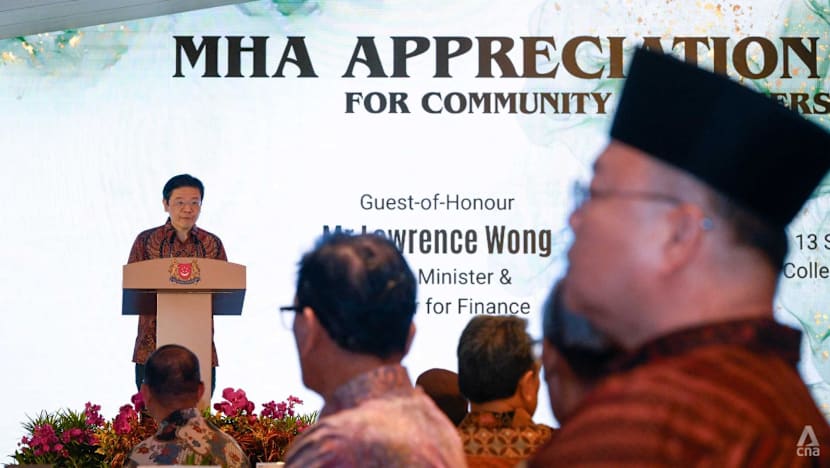Politics
Singapore Enhances Rehabilitation Efforts to Combat Self-Radicalisation

Singapore is set to bolster its rehabilitation programs in response to a rise in self-radicalisation, as announced by Prime Minister Lawrence Wong on September 13, 2023. During a speech at the Ministry of Home Affairs’ annual appreciation lunch for community volunteers, he emphasized the need to address a broader spectrum of extremist ideologies beyond Islamic extremism.
Wong highlighted that Singaporeans are increasingly drawn to various radical beliefs, necessitating a more comprehensive approach. “Now we have to go beyond Islamic religious counselling because Singaporeans are succumbing to a wider range of extremist ideologies,” he stated. The government is implementing a suite of interventions, including mentorship programs and initiatives aimed at enhancing social skills and cyber wellness, specifically designed for self-radicalised youths.
The Prime Minister referenced the case of a Christian youth detained in December 2020 for planning attacks on two mosques. This individual, who was 16 at the time of his arrest, became the first Singaporean processed under the Internal Security Act (ISA) for radicalisation linked to far-right extremist ideologies. Following his release in January 2024, he has since received counselling focused on non-violence and inter-faith harmony, supported by mentors including a volunteer from the Religious Rehabilitation Group.
In a broader context, Wong noted that social isolation contributes significantly to self-radicalisation. “To counter that, we have to foster belonging, human connections and trust,” he said. His comments came on the heels of reports that two Singaporeans had been issued restriction orders under the ISA, highlighting the urgent need for effective intervention strategies.
The cases included Muhammad Jihadul Mustaqiim Mahmud, a 30-year-old who expressed intentions to join armed groups in Syria and Turkey, and a 14-year-old who supported the Islamic State (ISIS) while also identifying with far-right extremist views. This teenager marks the first instance in Singapore of a youth radicalised by a blend of extremist ideologies.
Wong pointed out a troubling trend: since 2015, there have been 18 cases of youths aged 14 to 20 dealt with under the ISA, with over two-thirds occurring in the last five years. This surge correlates with advancements in digital technology that have made extremist propaganda more accessible. He cited the recent murder of US right-wing activist Charlie Kirk as evidence of how online radicalisation can manifest in real-world violence.
In Singapore, authorities have encountered cases where individuals used artificial intelligence chatbots to draft manifestos advocating armed conflict or to seek guidance on weapon manufacturing, including 3D-printed firearms. The scope of extremist ideologies has expanded beyond religious motivations, now encompassing movements such as neo-Nazism and the incel subculture, associated with negative attitudes towards women.
In response, the Singaporean government is committed to enhancing international cooperation, focusing on intelligence sharing and resource exchange. Wong expressed confidence in the global interest in Singapore’s rehabilitation strategies, stating that the country is willing to share its experiences while learning from other nations.
While acknowledging the role of security agencies in detecting and neutralising threats, Wong urged every Singaporean to participate actively in preventing radicalisation. “If you see a loved one succumbing to extremist ideologies, please help to report them early so that they can receive help,” he advised.
Reflecting on the importance of community cohesion, Wong reiterated that Singapore has dedicated the last 60 years to strengthening ties across racial and religious lines. He warned against new divides, particularly socioeconomic ones, that could threaten the fabric of trust and unity. “The more united we are, the more resilient we will be against these divisive forces,” he concluded.
-

 Business5 months ago
Business5 months agoKenvue Dismisses CEO Thibaut Mongon as Strategic Review Advances
-

 Lifestyle4 months ago
Lifestyle4 months agoHumanism Camp Engages 250 Youths in Summer Fest 2025
-

 Sports4 months ago
Sports4 months agoDe Minaur Triumphs at Washington Open After Thrilling Comeback
-

 Sports5 months ago
Sports5 months agoTupou and Daugunu Join First Nations Squad for Lions Clash
-

 Top Stories5 months ago
Top Stories5 months agoColombian Senator Miguel Uribe Shows Signs of Recovery After Attack
-

 World5 months ago
World5 months agoASEAN Gears Up for Historic Joint Meeting of Foreign and Economic Ministers
-

 Health4 months ago
Health4 months agoNew Study Challenges Assumptions About Aging and Inflammation
-

 Business5 months ago
Business5 months agoOil Prices Surge Following New EU Sanctions on Russia
-

 Entertainment4 months ago
Entertainment4 months agoDetaşe-Sabah Violin Ensemble Captivates at Gabala Music Festival
-

 Entertainment4 months ago
Entertainment4 months agoBaku Metro Extends Hours for Justin Timberlake Concert
-

 Top Stories5 months ago
Top Stories5 months agoRethinking Singapore’s F&B Regulations Amid Business Closures
-

 Business5 months ago
Business5 months agoU.S. House Approves Stablecoin Bill, Sends to Trump for Signature









